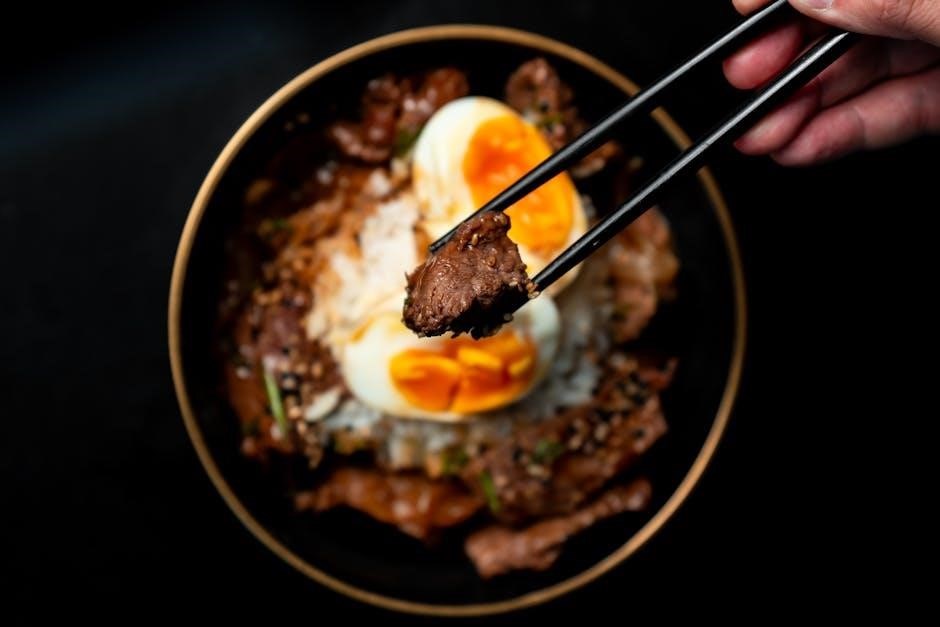Learning to cook eggs in a microwave egg boiler is easy with simple steps and guidelines provided in the instructions for perfect results every time using a microwave.
Overview of the Importance of Correct Cooking Methods
Correct cooking methods are essential when using a microwave egg boiler to achieve perfectly cooked eggs. The importance of correct cooking methods lies in the fact that it ensures the eggs are cooked evenly and safely. Using a microwave egg boiler requires attention to detail and adherence to the instructions provided. The correct cooking method involves adding the right amount of water‚ placing the eggs in the boiler‚ and cooking them for the recommended time. This helps to prevent overcooking or undercooking the eggs‚ which can affect their texture and taste. By following the correct cooking methods‚ users can enjoy perfectly cooked eggs every time‚ whether they prefer soft-boiled‚ hard-boiled‚ or poached eggs. The correct cooking method also helps to preserve the nutritional value of the eggs‚ making them a healthy and delicious addition to any meal. Proper cooking methods are crucial for food safety.

Benefits of Using a Microwave Egg Boiler
Using a microwave egg boiler offers convenience and ease of cooking eggs quickly and safely always.
Convenience and Ease of Use of Microwave Egg Boilers
The convenience and ease of use of microwave egg boilers make them a great addition to any kitchen‚ allowing for quick and easy cooking of eggs.
With a microwave egg boiler‚ you can cook eggs to your desired level of doneness in just a few minutes‚ making it a great option for busy mornings or snacks.
The ease of use is also a major advantage‚ as you simply need to add water‚ place the eggs in the boiler‚ and set the microwave timer.
This convenience and ease of use make microwave egg boilers a popular choice for many people‚ and they are a great option for anyone looking to make cooking eggs easier and faster.
Overall‚ the convenience and ease of use of microwave egg boilers make them a great kitchen tool‚ and they are definitely worth considering if you are looking for a easy way to cook eggs.

Materials and Construction of Microwave Egg Boilers
Microwave egg boilers are made from sturdy‚ microwave-safe plastic materials for durability and safety always.
Types of Materials Used for Microwave Egg Boilers
Microwave egg boilers are typically made from food-safe plastic materials that are durable and easy to clean. The plastic used is usually BPA-free and microwave-safe‚ ensuring that it does not melt or release harmful chemicals when heated. Some microwave egg boilers may also have metal components‚ such as a metal tray or lid‚ which are designed to be safe for use in the microwave. The materials used for microwave egg boilers are generally lightweight and easy to handle‚ making them convenient to use and store. Additionally‚ the materials are often dishwasher safe‚ making cleaning up after use a breeze. Overall‚ the materials used for microwave egg boilers are designed to be safe‚ durable‚ and easy to use‚ making them a convenient and practical kitchen tool. The use of these materials allows for easy cooking and cleaning of eggs.
Step-by-Step Instructions for Using a Microwave Egg Boiler
Follow the instructions and guidelines for microwave egg boiler usage carefully.
Adding Water and Placing Eggs in the Boiler
To start cooking eggs in a microwave egg boiler‚ first add water to the base of the boiler‚ the amount of water may vary depending on the type of egg boiler being used;
Then gently place one or more eggs into the boiler‚ making sure not to crack them.
The boiler is designed to cook eggs to perfection‚ with the water helping to cook the eggs evenly.
The eggs should be placed in a single layer‚ not stacked on top of each other‚ to ensure even cooking.
It is also important to make sure the eggs are clean and dry before placing them in the boiler.
The microwave egg boiler is designed to make cooking eggs easy and convenient‚ and by following these simple steps‚ you can have perfectly cooked eggs every time.
The boiler is easy to use and clean‚ making it a great addition to any kitchen.
With the eggs in place‚ the next step is to secure the lid and place the boiler in the microwave.
Cooking Times and Methods for Different Types of Eggs
Cooking times vary for soft and hard boiled eggs in microwave egg boilers typically.
Cooking Times for Soft and Hard Boiled Eggs
Cooking times for soft and hard boiled eggs in a microwave egg boiler can vary depending on the microwave’s wattage and the desired level of doneness. Generally‚ cooking times range from 3 to 5 minutes for soft boiled eggs and 8 to 10 minutes for hard boiled eggs. It is essential to follow the instructions provided with the microwave egg boiler to ensure perfect results. The cooking time may need to be adjusted based on personal preference for the yolk’s consistency. Some microwave egg boilers come with guidelines for cooking times‚ making it easier to achieve the desired level of doneness. By following these guidelines‚ users can enjoy perfectly cooked eggs every time. The key to achieving perfect cooking times is to experiment with different cooking times and adjust as needed. This ensures the eggs are cooked to the desired level of doneness.

Tips for Achieving Perfectly Cooked Eggs
Follow guidelines and adjust cooking times for desired doneness using a microwave egg boiler to achieve perfect results every time with eggs.
Importance of Piercing the Egg Shell Before Cooking
To ensure safe and effective cooking‚ piercing the egg shell before cooking is crucial when using a microwave egg boiler. This simple step helps to prevent eggs from exploding due to steam buildup. The included piercing pin is used to create a small hole in the egg shell‚ allowing steam to escape during cooking. By piercing the egg shell‚ users can avoid messy explosions and achieve perfectly cooked eggs every time. The piercing process is quick and easy‚ and it is an essential step in the microwave egg boiling process. It is recommended to pierce the egg shell before adding it to the microwave egg boiler to ensure safe and effective cooking. The microwave egg boiler instructions typically include this important step to help users achieve the best results. Proper technique is necessary for optimal results.

Common Mistakes to Avoid When Using a Microwave Egg Boiler
Avoid overfilling and incorrect egg placement for optimal results using a microwave.
Overcooking and Undercooking of Eggs
Overcooking and undercooking of eggs are common mistakes that can occur when using a microwave egg boiler. To avoid overcooking‚ it is essential to follow the recommended cooking times and adjust according to the microwave’s power level. Undercooking‚ on the other hand‚ can be prevented by ensuring that the eggs are cooked for the minimum recommended time. The consequences of overcooking and undercooking can be unpleasant‚ resulting in eggs that are too hard or too runny. By being mindful of the cooking time and adjusting accordingly‚ users can achieve perfectly cooked eggs every time. It is also crucial to note that the type of egg and personal preference can affect the cooking time‚ so some experimentation may be necessary to find the ideal cooking time. Following the instructions and taking necessary precautions can help to avoid overcooking and undercooking of eggs.
